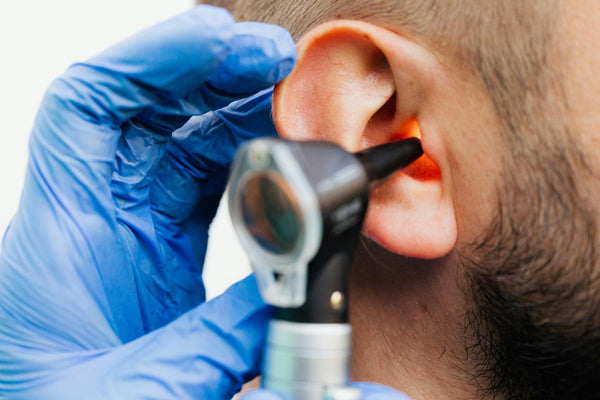
It’s not unusual for ears to turn red or feel warm from time to time. Often, it’s simply a normal reaction to temperature, emotion, or mild irritation. However, persistent redness, itching, or discomfort can sometimes signal an underlying issue - such as inflammation, skin sensitivity, or infection.
At Leightons, our friendly audiologists can help identify what’s causing the redness and ensure your ears are healthy, comfortable, and cared for properly.
What causes red ears?
Your ears contain many tiny blood vessels that react quickly to changes in temperature, emotions, or irritation. When these vessels widen, more blood flows to the area - creating warmth and a red appearance.
Redness can come and go quickly, but if it’s lasting or accompanied by pain or itching, it’s worth investigating further.
Common causes of red or burning ears
There are several reasons your ears might appear red or feel hot:
- Temperature changes: Cold weather or heat can cause your ears to flush as they adjust to different temperatures.
- Emotions: Stress, embarrassment, or anger can trigger the body’s natural “flushing” response.
- Allergies or irritation: Hair products, skin creams, jewellery, or hearing aids can sometimes irritate the skin.
- Sunburn: The ears are easily overlooked but sensitive to sunlight.
- Infection (otitis externa or otitis media): Redness combined with pain, swelling, or discharge may suggest infection.
- Skin conditions: Eczema or dermatitis can cause dry, red, or flaky skin around the ear.
- Ear wax blockage: A build-up can sometimes cause mild inflammation or warmth in the ear canal.
Symptoms to watch for
Red ears can appear on their own or with other symptoms such as:
- Warmth or burning sensations
- Itching or flaking skin
- Swelling or tenderness
- Fluid or discharge
- Muffled hearing
- Pain or discomfort
If redness lasts for more than a few days, or if your ears are painful or leaking fluid, it’s best to speak to a GP or seek professional advice.
When red ears could be a sign of a condition
Occasional ear redness is harmless, but persistent symptoms could indicate something more. Possible causes include:
- Outer ear infection (otitis externa): Often caused by bacteria or trapped moisture.
- Dermatitis or eczema: May cause itching, redness, and flaking around the ear.
- Allergic reaction: Triggered by products or materials that contact the skin.
- Inflammation or pressure: Sometimes linked to wax build-up or sinus congestion.
If your ears are red, sore, or warm to the touch, a professional ear examination can help identify the cause quickly and safely.
Safe ways to relieve red ears
You can often soothe red or warm ears at home with gentle care:
- Cool or warm compresses: Apply gently to ease discomfort or swelling.
- Avoid irritants: Steer clear of fragranced hair or skincare products near the ears.
- Protect from the sun and cold: Use sunscreen or a hat outdoors.
- Keep ears clean and dry: After washing or swimming, gently dry the outer ear with a towel.
- Don’t scratch: Scratching can worsen redness or introduce infection.
When to see a professional
It’s best to speak with a GP or seek advice if:
- Redness is persistent or worsening
- You notice swelling, discharge, or pain
- The skin around your ears feels dry, cracked, or flaky
- Your hearing feels muffled or blocked
Leightons’ audiologists can carry out a detailed ear health check to identify certain issues - whether it’s irritation, wax build-up, or early signs of infection.
How Leightons can help
At Leightons, we take a caring, personalised approach to ear health. Our audiologists will:
- Examine your ears safely and gently
- Identify any signs of infection, inflammation, or blockage
- Provide professional ear wax removal where needed
- Offer tailored advice to protect your ear health and prevent irritation
- Our focus is always on comfort, clarity, and care - helping you understand what’s happening and how to feel better.
Preventing red ears
You can reduce your risk of redness or irritation with a few simple habits:
- Avoid harsh soaps, sprays, or perfumes near your ears
- Protect ears from extreme temperatures and sunlight
- Clean hearing aids and earmolds regularly
- Manage skin conditions like eczema with gentle skincare
Book a free hearing assessment with Leightons to keep your ears comfortable and healthy.







